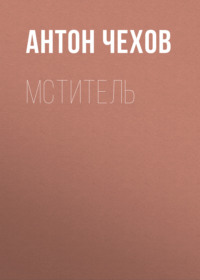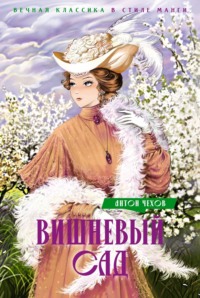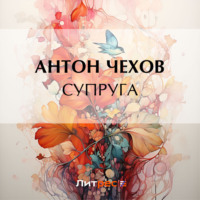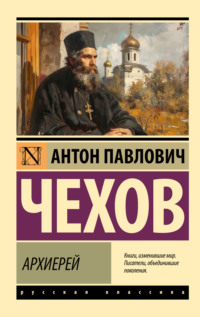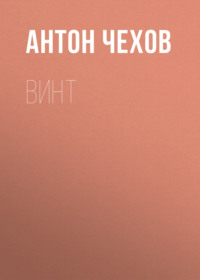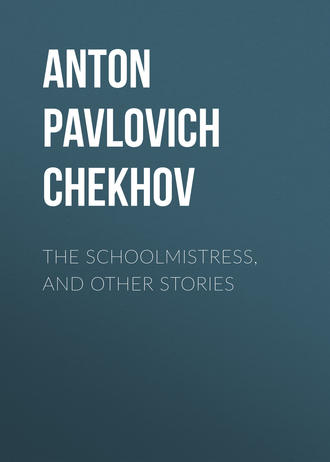 полная версия
полная версияThe Schoolmistress, and Other Stories
he hummed in an undertone.
And the tune for some reason haunted him and his friends all the way, and all three of them hummed it mechanically, not in time with one another.
Vassilyev’s imagination was picturing how, in another ten minutes, he and his friends would knock at a door; how by little dark passages and dark rooms they would steal in to the women; how, taking advantage of the darkness, he would strike a match, would light up and see the face of a martyr and a guilty smile. The unknown, fair or dark, would certainly have her hair down and be wearing a white dressing-jacket; she would be panic-stricken by the light, would be fearfully confused, and would say: “For God’s sake, what are you doing! Put it out!” It would all be dreadful, but interesting and new.
The friends turned out of Trubnoy Square into Gratchevka, and soon reached the side street which Vassilyev only knew by reputation. Seeing two rows of houses with brightly lighted windows and wide-open doors, and hearing gay strains of pianos and violins, sounds which floated out from every door and mingled in a strange chaos, as though an unseen orchestra were tuning up in the darkness above the roofs, Vassilyev was surprised and said:
“What a lot of houses!”
“That’s nothing,” said the medical student. “In London there are ten times as many. There are about a hundred thousand such women there.”
The cabmen were sitting on their boxes as calmly and indifferently as in any other side street; the same passers-by were walking along the pavement as in other streets. No one was hurrying, no one was hiding his face in his coat-collar, no one shook his head reproachfully… And in this indifference to the noisy chaos of pianos and violins, to the bright windows and wide-open doors, there was a feeling of something very open, insolent, reckless, and devil-may-care. Probably it was as gay and noisy at the slave-markets in their day, and people’s faces and movements showed the same indifference.
“Let us begin from the beginning,” said the artist.
The friends went into a narrow passage lighted by a lamp with a reflector. When they opened the door a man in a black coat, with an unshaven face like a flunkey’s, and sleepy-looking eyes, got up lazily from a yellow sofa in the hall. The place smelt like a laundry with an odor of vinegar in addition. A door from the hall led into a brightly lighted room. The medical student and the artist stopped at this door and, craning their necks, peeped into the room.
“Buona sera, signori, rigolleto – hugenotti – traviata!” began the artist, with a theatrical bow.
“Havanna – tarakano – pistoleto!” said the medical student, pressing his cap to his breast and bowing low.
Vassilyev was standing behind them. He would have liked to make a theatrical bow and say something silly, too, but he only smiled, felt an awkwardness that was like shame, and waited impatiently for what would happen next.
A little fair girl of seventeen or eighteen, with short hair, in a short light-blue frock with a bunch of white ribbon on her bosom, appeared in the doorway.
“Why do you stand at the door?” she said. “Take off your coats and come into the drawing-room.”
The medical student and the artist, still talking Italian, went into the drawing-room. Vassilyev followed them irresolutely.
“Gentlemen, take off your coats!” the flunkey said sternly; “you can’t go in like that.”
In the drawing-room there was, besides the girl, another woman, very stout and tall, with a foreign face and bare arms. She was sitting near the piano, laying out a game of patience on her lap. She took no notice whatever of the visitors.
“Where are the other young ladies?” asked the medical student.
“They are having their tea,” said the fair girl. “Stepan,” she called, “go and tell the young ladies some students have come!”
A little later a third young lady came into the room. She was wearing a bright red dress with blue stripes. Her face was painted thickly and unskillfully, her brow was hidden under her hair, and there was an unblinking, frightened stare in her eyes. As she came in, she began at once singing some song in a coarse, powerful contralto. After her a fourth appeared, and after her a fifth…
In all this Vassilyev saw nothing new or interesting. It seemed to him that that room, the piano, the looking-glass in its cheap gilt frame, the bunch of white ribbon, the dress with the blue stripes, and the blank indifferent faces, he had seen before and more than once. Of the darkness, the silence, the secrecy, the guilty smile, of all that he had expected to meet here and had dreaded, he saw no trace.
Everything was ordinary, prosaic, and uninteresting. Only one thing faintly stirred his curiosity – the terrible, as it were intentionally designed, bad taste which was visible in the cornices, in the absurd pictures, in the dresses, in the bunch of ribbons. There was something characteristic and peculiar in this bad taste.
“How poor and stupid it all is!” thought Vassilyev. “What is there in all this trumpery I see now that can tempt a normal man and excite him to commit the horrible sin of buying a human being for a rouble? I understand any sin for the sake of splendor, beauty, grace, passion, taste; but what is there here? What is there here worth sinning for? But… one mustn’t think!”
“Beardy, treat me to some porter!” said the fair girl, addressing him.
Vassilyev was at once overcome with confusion.
“With pleasure,” he said, bowing politely. “Only excuse me, madam, I… I won’t drink with you. I don’t drink.”
Five minutes later the friends went off into another house.
“Why did you ask for porter?” said the medical student angrily. “What a millionaire! You have thrown away six roubles for no reason whatever – simply waste!”
“If she wants it, why not let her have the pleasure?” said Vassilyev, justifying himself.
“You did not give pleasure to her, but to the ‘Madam.’ They are told to ask the visitors to stand them treat because it is a profit to the keeper.”
“Behold the mill…” hummed the artist, “in ruins now…”
Going into the next house, the friends stopped in the hall and did not go into the drawing-room. Here, as in the first house, a figure in a black coat, with a sleepy face like a flunkey’s, got up from a sofa in the hall. Looking at this flunkey, at his face and his shabby black coat, Vassilyev thought: “What must an ordinary simple Russian have gone through before fate flung him down as a flunkey here? Where had he been before and what had he done? What was awaiting him? Was he married? Where was his mother, and did she know that he was a servant here?” And Vassilyev could not help particularly noticing the flunkey in each house. In one of the houses – he thought it was the fourth – there was a little spare, frail-looking flunkey with a watch-chain on his waistcoat. He was reading a newspaper, and took no notice of them when they went in. Looking at his face Vassilyev, for some reason, thought that a man with such a face might steal, might murder, might bear false witness. But the face was really interesting: a big forehead, gray eyes, a little flattened nose, thin compressed lips, and a blankly stupid and at the same time insolent expression like that of a young harrier overtaking a hare. Vassilyev thought it would be nice to touch this man’s hair, to see whether it was soft or coarse. It must be coarse like a dog’s.
III
Having drunk two glasses of porter, the artist became suddenly tipsy and grew unnaturally lively.
“Let’s go to another!” he said peremptorily, waving his hands. “I will take you to the best one.”
When he had brought his friends to the house which in his opinion was the best, he declared his firm intention of dancing a quadrille. The medical student grumbled something about their having to pay the musicians a rouble, but agreed to be his vis-a-vis. They began dancing.
It was just as nasty in the best house as in the worst. Here there were just the same looking-glasses and pictures, the same styles of coiffure and dress. Looking round at the furnishing of the rooms and the costumes, Vassilyev realized that this was not lack of taste, but something that might be called the taste, and even the style, of S. Street, which could not be found elsewhere – something intentional in its ugliness, not accidental, but elaborated in the course of years. After he had been in eight houses he was no longer surprised at the color of the dresses, at the long trains, the gaudy ribbons, the sailor dresses, and the thick purplish rouge on the cheeks; he saw that it all had to be like this, that if a single one of the women had been dressed like a human being, or if there had been one decent engraving on the wall, the general tone of the whole street would have suffered.
“How unskillfully they sell themselves!” he thought. “How can they fail to understand that vice is only alluring when it is beautiful and hidden, when it wears the mask of virtue? Modest black dresses, pale faces, mournful smiles, and darkness would be far more effective than this clumsy tawdriness. Stupid things! If they don’t understand it of themselves, their visitors might surely have taught them…”
A young lady in a Polish dress edged with white fur came up to him and sat down beside him.
“You nice dark man, why aren’t you dancing?” she asked. “Why are you so dull?”
“Because it is dull.”
“Treat me to some Lafitte. Then it won’t be dull.”
Vassilyev made no answer. He was silent for a little, and then asked:
“What time do you get to sleep?”
“At six o’clock.”
“And what time do you get up?”
“Sometimes at two and sometimes at three.”
“And what do you do when you get up?”
“We have coffee, and at six o’clock we have dinner.”
“And what do you have for dinner?”
“Usually soup, beefsteak, and dessert. Our madam keeps the girls well. But why do you ask all this?”
“Oh, just to talk…”
Vassilyev longed to talk to the young lady about many things. He felt an intense desire to find out where she came from, whether her parents were living, and whether they knew that she was here; how she had come into this house; whether she were cheerful and satisfied, or sad and oppressed by gloomy thoughts; whether she hoped some day to get out of her present position… But he could not think how to begin or in what shape to put his questions so as not to seem impertinent. He thought for a long time, and asked:
“How old are you?”
“Eighty,” the young lady jested, looking with a laugh at the antics of the artist as he danced.
All at once she burst out laughing at something, and uttered a long cynical sentence loud enough to be heard by everyone. Vassilyev was aghast, and not knowing how to look, gave a constrained smile. He was the only one who smiled; all the others, his friends, the musicians, the women, did not even glance towards his neighbor, but seemed not to have heard her.
“Stand me some Lafitte,” his neighbor said again.
Vassilyev felt a repulsion for her white fur and for her voice, and walked away from her. It seemed to him hot and stifling, and his heart began throbbing slowly but violently, like a hammer – one! two! three!
“Let us go away!” he said, pulling the artist by his sleeve.
“Wait a little; let me finish.”
While the artist and the medical student were finishing the quadrille, to avoid looking at the women, Vassilyev scrutinized the musicians. A respectable-looking old man in spectacles, rather like Marshal Bazaine, was playing the piano; a young man with a fair beard, dressed in the latest fashion, was playing the violin. The young man had a face that did not look stupid nor exhausted, but intelligent, youthful, and fresh. He was dressed fancifully and with taste; he played with feeling. It was a mystery how he and the respectable-looking old man had come here. How was it they were not ashamed to sit here? What were they thinking about when they looked at the women?
If the violin and the piano had been played by men in rags, looking hungry, gloomy, drunken, with dissipated or stupid faces, then one could have understood their presence, perhaps. As it was, Vassilyev could not understand it at all. He recalled the story of the fallen woman he had once read, and he thought now that that human figure with the guilty smile had nothing in common with what he was seeing now. It seemed to him that he was seeing not fallen women, but some different world quite apart, alien to him and incomprehensible; if he had seen this world before on the stage, or read of it in a book, he would not have believed in it…
The woman with the white fur burst out laughing again and uttered a loathsome sentence in a loud voice. A feeling of disgust took possession of him. He flushed crimson and went out of the room.
“Wait a minute, we are coming too!” the artist shouted to him.
IV
“While we were dancing,” said the medical student, as they all three went out into the street, “I had a conversation with my partner. We talked about her first romance. He, the hero, was an accountant at Smolensk with a wife and five children. She was seventeen, and she lived with her papa and mamma, who sold soap and candles.”
“How did he win her heart?” asked Vassilyev.
“By spending fifty roubles on underclothes for her. What next!”
“So he knew how to get his partner’s story out of her,” thought Vassilyev about the medical student. “But I don’t know how to.”
“I say, I am going home!” he said.
“What for?”
“Because I don’t know how to behave here. Besides, I am bored, disgusted. What is there amusing in it? If they were human beings – but they are savages and animals. I am going; do as you like.”
“Come, Grisha, Grigory, darling…” said the artist in a tearful voice, hugging Vassilyev, “come along! Let’s go to one more together and damnation take them!.. Please do, Grisha!”
They persuaded Vassilyev and led him up a staircase. In the carpet and the gilt banisters, in the porter who opened the door, and in the panels that decorated the hall, the same S. Street style was apparent, but carried to a greater perfection, more imposing.
“I really will go home!” said Vassilyev as he was taking off his coat.
“Come, come, dear boy,” said the artist, and he kissed him on the neck. “Don’t be tiresome… Gri-gri, be a good comrade! We came together, we will go back together. What a beast you are, really!”
“I can wait for you in the street. I think it’s loathsome, really!”
“Come, come, Grisha… If it is loathsome, you can observe it! Do you understand? You can observe!”
“One must take an objective view of things,” said the medical student gravely.
Vassilyev went into the drawing-room and sat down. There were a number of visitors in the room besides him and his friends: two infantry officers, a bald, gray-haired gentleman in spectacles, two beardless youths from the institute of land-surveying, and a very tipsy man who looked like an actor. All the young ladies were taken up with these visitors and paid no attention to Vassilyev.
Only one of them, dressed a la Aida, glanced sideways at him, smiled, and said, yawning: “A dark one has come…”
Vassilyev’s heart was throbbing and his face burned. He felt ashamed before these visitors of his presence here, and he felt disgusted and miserable. He was tormented by the thought that he, a decent and loving man (such as he had hitherto considered himself), hated these women and felt nothing but repulsion towards them. He felt pity neither for the women nor the musicians nor the flunkeys.
“It is because I am not trying to understand them,” he thought. “They are all more like animals than human beings, but of course they are human beings all the same, they have souls. One must understand them and then judge…”
“Grisha, don’t go, wait for us,” the artist shouted to him and disappeared.
The medical student disappeared soon after.
“Yes, one must make an effort to understand, one mustn’t be like this…” Vassilyev went on thinking.
And he began gazing at each of the women with strained attention, looking for a guilty smile. But either he did not know how to read their faces, or not one of these women felt herself to be guilty; he read on every face nothing but a blank expression of everyday vulgar boredom and complacency. Stupid faces, stupid smiles, harsh, stupid voices, insolent movements, and nothing else. Apparently each of them had in the past a romance with an accountant based on underclothes for fifty roubles, and looked for no other charm in the present but coffee, a dinner of three courses, wines, quadrilles, sleeping till two in the afternoon…
Finding no guilty smile, Vassilyev began to look whether there was not one intelligent face. And his attention was caught by one pale, rather sleepy, exhausted-looking face… It was a dark woman, not very young, wearing a dress covered with spangles; she was sitting in an easy-chair, looking at the floor lost in thought. Vassilyev walked from one corner of the room to the other, and, as though casually, sat down beside her.
“I must begin with something trivial,” he thought, “and pass to what is serious…”
“What a pretty dress you have,” and with his finger he touched the gold fringe of her fichu.
“Oh, is it?..” said the dark woman listlessly.
“What province do you come from?”
“I? From a distance… From Tchernigov.”
“A fine province. It’s nice there.”
“Any place seems nice when one is not in it.”
“It’s a pity I cannot describe nature,” thought Vassilyev. “I might touch her by a description of nature in Tchernigov. No doubt she loves the place if she has been born there.”
“Are you dull here?” he asked.
“Of course I am dull.”
“Why don’t you go away from here if you are dull?”
“Where should I go to? Go begging or what?”
“Begging would be easier than living here.”
“How do you know that? Have you begged?”
“Yes, when I hadn’t the money to study. Even if I hadn’t anyone could understand that. A beggar is anyway a free man, and you are a slave.”
The dark woman stretched, and watched with sleepy eyes the footman who was bringing a trayful of glasses and seltzer water.
“Stand me a glass of porter,” she said, and yawned again.
“Porter,” thought Vassilyev. “And what if your brother or mother walked in at this moment? What would you say? And what would they say? There would be porter then, I imagine…”
All at once there was the sound of weeping. From the adjoining room, from which the footman had brought the seltzer water, a fair man with a red face and angry eyes ran in quickly. He was followed by the tall, stout “madam,” who was shouting in a shrill voice:
“Nobody has given you leave to slap girls on the cheeks! We have visitors better than you, and they don’t fight! Impostor!”
A hubbub arose. Vassilyev was frightened and turned pale. In the next room there was the sound of bitter, genuine weeping, as though of someone insulted. And he realized that there were real people living here who, like people everywhere else, felt insulted, suffered, wept, and cried for help. The feeling of oppressive hate and disgust gave way to an acute feeling of pity and anger against the aggressor. He rushed into the room where there was weeping. Across rows of bottles on a marble-top table he distinguished a suffering face, wet with tears, stretched out his hands towards that face, took a step towards the table, but at once drew back in horror. The weeping girl was drunk.
As he made his way though the noisy crowd gathered about the fair man, his heart sank and he felt frightened like a child; and it seemed to him that in this alien, incomprehensible world people wanted to pursue him, to beat him, to pelt him with filthy words… He tore down his coat from the hatstand and ran headlong downstairs.
V
Leaning against the fence, he stood near the house waiting for his friends to come out. The sounds of the pianos and violins, gay, reckless, insolent, and mournful, mingled in the air in a sort of chaos, and this tangle of sounds seemed again like an unseen orchestra tuning up on the roofs. If one looked upwards into the darkness, the black background was all spangled with white, moving spots: it was snow falling. As the snowflakes came into the light they floated round lazily in the air like down, and still more lazily fell to the ground. The snowflakes whirled thickly round Vassilyev and hung upon his beard, his eyelashes, his eyebrows… The cabmen, the horses, and the passers-by were white.
“And how can the snow fall in this street!” thought Vassilyev. “Damnation take these houses!”
His legs seemed to be giving way from fatigue, simply from having run down the stairs; he gasped for breath as though he had been climbing uphill, his heart beat so loudly that he could hear it. He was consumed by a desire to get out of the street as quickly as possible and to go home, but even stronger was his desire to wait for his companions and vent upon them his oppressive feeling.
There was much he did not understand in these houses, the souls of ruined women were a mystery to him as before; but it was clear to him that the thing was far worse than could have been believed. If that sinful woman who had poisoned herself was called fallen, it was difficult to find a fitting name for all these who were dancing now to this tangle of sound and uttering long, loathsome sentences. They were not on the road to ruin, but ruined.
“There is vice,” he thought, “but neither consciousness of sin nor hope of salvation. They are sold and bought, steeped in wine and abominations, while they, like sheep, are stupid, indifferent, and don’t understand. My God! My God!”
It was clear to him, too, that everything that is called human dignity, personal rights, the Divine image and semblance, were defiled to their very foundations – “to the very marrow,” as drunkards say – and that not only the street and the stupid women were responsible for it.
A group of students, white with snow, passed him laughing and talking gaily; one, a tall thin fellow, stopped, glanced into Vassilyev’s face, and said in a drunken voice:
“One of us! A bit on, old man? Aha-ha! Never mind, have a good time! Don’t be down-hearted, old chap!”
He took Vassilyev by the shoulder and pressed his cold wet mustache against his cheek, then he slipped, staggered, and, waving both hands, cried:
“Hold on! Don’t upset!”
And laughing, he ran to overtake his companions.
Through the noise came the sound of the artist’s voice:
“Don’t you dare to hit the women! I won’t let you, damnation take you! You scoundrels!”
The medical student appeared in the doorway. He looked from side to side, and seeing Vassilyev, said in an agitated voice:
“You here! I tell you it’s really impossible to go anywhere with Yegor! What a fellow he is! I don’t understand him! He has got up a scene! Do you hear? Yegor!” he shouted at the door. “Yegor!”
“I won’t allow you to hit women!” the artist’s piercing voice sounded from above. Something heavy and lumbering rolled down the stairs. It was the artist falling headlong. Evidently he had been pushed downstairs.
He picked himself up from the ground, shook his hat, and, with an angry and indignant face, brandished his fist towards the top of the stairs and shouted:
“Scoundrels! Torturers! Bloodsuckers! I won’t allow you to hit them! To hit a weak, drunken woman! Oh, you brutes!..”
“Yegor!.. Come, Yegor!..” the medical student began imploring him. “I give you my word of honor I’ll never come with you again. On my word of honor I won’t!”
Little by little the artist was pacified and the friends went homewards.
“Against my will an unknown force,” hummed the medical student, “has led me to these mournful shores.”
“Behold the mill,” the artist chimed in a little later, “in ruins now. What a lot of snow, Holy Mother! Grisha, why did you go? You are a funk, a regular old woman.”
Vassilyev walked behind his companions, looked at their backs, and thought:
“One of two things: either we only fancy prostitution is an evil, and we exaggerate it; or, if prostitution really is as great an evil as is generally assumed, these dear friends of mine are as much slaveowners, violators, and murderers, as the inhabitants of Syria and Cairo, that are described in the ‘Neva.’ Now they are singing, laughing, talking sense, but haven’t they just been exploiting hunger, ignorance, and stupidity? They have – I have been a witness of it. What is the use of their humanity, their medicine, their painting? The science, art, and lofty sentiments of these soul-destroyers remind me of the piece of bacon in the story. Two brigands murdered a beggar in a forest; they began sharing his clothes between them, and found in his wallet a piece of bacon. ‘Well found,’ said one of them, ‘let us have a bit.’ ‘What do you mean? How can you?’ cried the other in horror. ‘Have you forgotten that to-day is Wednesday?’ And they would not eat it. After murdering a man, they came out of the forest in the firm conviction that they were keeping the fast. In the same way these men, after buying women, go their way imagining that they are artists and men of science…”



